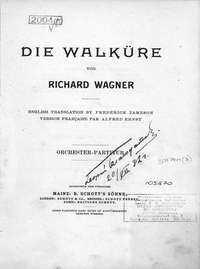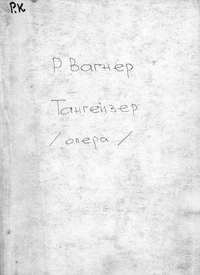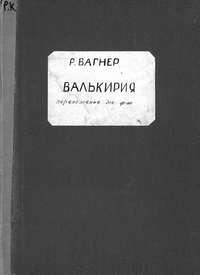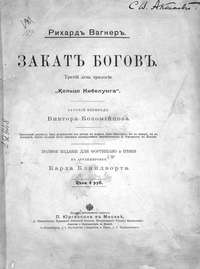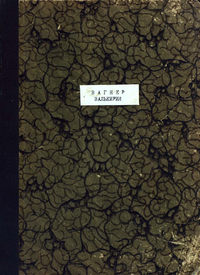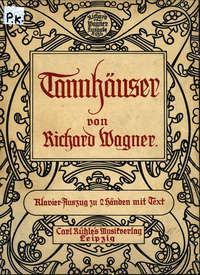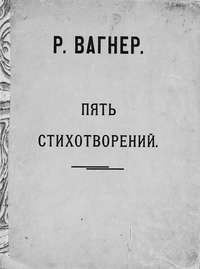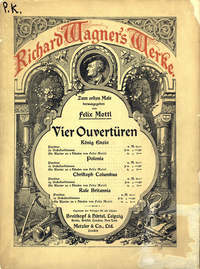 полная версия
полная версияMy Life. Volume 2
As regards the prelude to the Meistersinger, its successful performance affected the few friends who formed the audience so favourably that we had to repeat it there and then—to the satisfaction even of the orchestra. Indeed, their artificially nurtured distrust of me, which had been like a coating of ice, now seemed to have melted, for when I brought the concert to a close with the Tannhauser Overture the orchestra celebrated my recall with a tremendous flourish of instruments. This delighted my sister Ottilie beyond measure, as she maintained that such an honour had never been accorded before except to Jenny Lind. My friend Weisheimer, who had really tired every one's patience in the most inconsiderate way, afterwards developed a feeling of dissatisfaction towards me which dated from this period. He felt bound to confess to himself that he would have done much better without my brilliant orchestral pieces, in which case he might have offered the public a concert at a cheaper rate, consisting exclusively of his own works. As it was, he had to bear the costs—to his father's great disappointment—and also to overcome the unnecessary humiliation of being unable to give me any profits.
My brother-in-law was not to be deterred by these painful impressions from carrying out the household festivities, which had been arranged beforehand in celebration of my expected triumphs. The Bulows were also invited to one of the banquets, and there was an evening party at which I read the Meistersinger to an imposing array of professors, and met with much appreciation. I renewed my acquaintance with Professor Weiss, too, who interested me very much, for I remembered him from my young days as a friend of my uncle's. He expressed himself as particularly surprised by my skill in reading aloud.
The Bulows had now unfortunately returned to Berlin. We had met once more on a very cold day in the street (under unpleasant conditions, for they were paying duty calls), but the general depression which had settled on us seemed more noticeable, during our short leave-taking, than the fleeting good-humour of the last few days. My friends were well aware of the terrible and utterly forlorn condition in which I found myself. I had been idiotic enough to count on the proceeds from the Leipzig concert to provide at least the needs of the moment, and I was, in the first place, put into the awkward position of being unable to pay my landlord punctually (the house rent at Biebrich being now due). But I was ready to stake everything on keeping this asylum for another year, and I had to deal with an obstinate, bad-tempered creature whom I thought it necessary to pay in advance for the sake of securing the place. As I had just then to supply Minna with her quarterly allowance also, the money which Regierungsrath Muller forwarded to me from the Grand Duke seemed, indeed, a heaven-sent windfall. For after giving up Schott entirely I had, in my distress, turned to this old acquaintance and begged him to explain my situation to the Grand Duke and induce him to send me some help—to be regarded possibly as payment in advance for my new operas. In response to this I received the startling and unexpected sum of fifteen hundred marks through Muller's instrumentality. It was not until some time after that I accounted for this generosity by the supposition that the Grand Duke's amiable behaviour towards me had been a deliberate attempt to make an impression upon his friend Liszt, whom he wished to entice back to Weimar at all costs. He was certainly not mistaken in counting on the excellent effect his binding generosity to me would have on our common friend.
I was therefore in a position to go to Dresden for a few days at once, to renew my provision for Minna, and at the same time to honour her with one of the visits deemed necessary to support her in her difficult situation. Minna conducted me from the station to the flat which she had taken and furnished in Walpurgisstrasse, a street which had not been built at the time I left Dresden. She had as usual arranged her home very tastefully, and with the aim evidently of making me comfortable. I was greeted on the threshold by a little mat embroidered with the word Salve, and I recognised our Paris drawing-room at once in the red silk curtains and the furniture. I was to have a majestic bedroom, an exceedingly comfortable study on the other side, as well as the drawing-room at my entire disposal, while she installed herself in one little room with recesses looking on to the yard. The study was adorned by the magnificent mahogany bureau which had originally been made for my house when I was conductor at Dresden. It had been bought in by the Ritter family, after my flight from that city, and presented to Kummer, the son-in-law, from whom Minna had hired it temporarily, leaving me the option of buying it back for one hundred and eighty marks. As I showed no desire to do so her mood became gloomier. Oppressed by the fearful embarrassment which she experienced on being alone with me, she had invited my sister Clara to come on a visit from Chemnitz, and was now sharing the small room at her disposal with Her. Clara proved herself extraordinarily wise and sympathetic on this as on former occasions. She pitied Minna of course, and was anxious to help her at this difficult period, though always with a view to strengthening her in the conviction that our parting was unavoidable. An exact knowledge of my extremely awkward position now seemed called for. My financial difficulties were so crushing that the only excuse for telling Minna was to silence her uneasy suspicions about me. I did, however, succeed in avoiding all explanations with her—the more easily as my meetings with Fritz Brockhaus and his family (including the married daughter Clara Kessinger), the Pusinellis, old Heine, and lastly the two Schnorrs, provided a pretext for our spending most of the time in the society of others.
I filled the mornings by making calls, and it was when I set out to pay my respects and thanks to Minister Bar for my amnesty that I trod the familiar streets of Dresden again. My first impression was one of extraordinary boredom and emptiness, for I had last seen them filled with barricades, in which fantastic condition they had looked so unusually interesting. I did not see a single familiar face on the way. Even the glover, whom I had always patronised and whose shop I now had occasion to revisit, did not seem to know me, until an oldish man rushed across the street to me and greeted me with great excitement and tears in his eyes. It turned out to be Karl Kummer of the court orchestra (looking much older), the most inspired oboist I ever met. I had taken him almost tenderly to my heart on account of his playing, and we embraced joyfully. I asked whether he still played his instrument as beautifully as before, whereupon he assured me that since I had left his oboe had failed to give real satisfaction, and it was now a long time since he had had himself pensioned off. He told me in response to my inquiries that all my old military bandsmen—including Dietz, the tall double-bass player—were either dead or pensioned off. Our manager Luttichau and Conductor Reissiger were among those who had died, Lipinsky had returned to Poland long before, Schubert, the leader, was unfit for work, and everything seemed to me sad and strange. Minister Bar expressed to me the grave qualms he still felt about the amnesty granted me. True, he had ventured to sign it himself, but was still troubled to think that my great popularity as a composer of opera would make it easy for me to raise annoying demonstrations. I comforted him at once by promising only to remain a few days and to refrain from visiting the theatre, upon which he dismissed me with a deep sigh and an exceedingly grave face.
Very different was my reception from Herr von Beust, who with smiling elegance of manner implied by his conversation that I was perhaps not so innocent after all as I now seemed to think myself. He drew my attention to a letter of mine which had been found in Rockel's pocket, at the time. This was new to me, and I willingly gave him to understand that I felt myself bound to look on the amnesty accorded me as a pardon for my incautious behaviour in the past, and we parted with the liveliest manifestations of friendship.
We invited some friends one evening in Minna's drawing-room, where I read out the Meistersinger once more to the people who did not know it. After Minna had been provided with enough money to last some time, she accompanied me back to the station on the fourth day; but she was filled with such fearful presentiments of never seeing me again that her farewell was made in positive anguish.
At Leipzig I put up at an inn for one day. There I met Alexander Ritter, and we spent a pleasant evening together over our punch. The reason that had induced me to make this short stay was the assurance given me that if I gave a concert of my own it would not be one of the regular series. I had weighed this information with reference to the much-needed money it might bring in, but I now realised that the undertaking rested on no security. I returned in haste to Biebrich, where I had to get my household affairs into order. To my great annoyance I found my landlord in a more impossible temper than ever. He seemed unable to forget my having blamed him for his treatment of the dog, and also of my servant, whom I had been obliged to protect against him when she had had a love-affair with a tailor. In spite of receiving payment and promises he remained peevish, and insisted that he would have to move into my part of the house on account of his health in the coming spring. So while I forced him, by paying advance, to leave my household goods untouched until Easter at least, I went about trying to find a suitable house for the following year, visiting various places in the Rheingau under the guidance of Dr. Schuler and Mathilde Maier. I had no success, however, the time being so short, but my friends promised to search untiringly for what I wanted.
At Mayence I met Friederike Meyer again. Her situation in Frankfort seemed to have grown more and more difficult. When she heard that I had turned away Herr von Guaita's manager, who had been sent to Biebrich with instructions to pay me fifteen louis d'or for conducting Lohengrin, she upheld my action strongly. As for herself, she had broken with that gentleman entirely, insisting on being released from her contract, and was now about to enter upon a special engagement at the Burgtheater. She won my sympathy once more by her conduct and determination, which I had to consider as a powerful refutation of the calumnies brought up against her. As I too was in the act of starting for Vienna, she was glad to be able to make part of the journey in my company. She proposed to stop a day at Nuremberg, where I could pick her up for the next stage of the journey. This we did and arrived in Vienna together, where my friend went to Hotel Munsch, while I chose the Kaiserin Elizabeth, where I now felt at home. This was on the 15th of November. I went to see Conductor Esser at once, and heard from him that Tristan was really being studied vigorously. With Frau Dustmann, on the other hand, I became immediately involved in very unpleasant disagreements through my relation to her sister Friederike, which it was easy to misunderstand. It was impossible to make her see how things really stood. In her eyes her sister was involved in a liaison, and had been cast off by her family, so that her arrival in Vienna was compromising to them. In addition to this Friederike's own condition soon caused me the greatest anxiety. She had made an engagement to appear three times at the Burgtheater without considering that just then she was not likely to make a good appearance on the stage, particularly before the Viennese public. Her serious illness, the recovery from which had been attended by the most exciting circumstances, had disfigured her and made her very thin. She had also gone almost entirely bald, but nevertheless persisted in her great objection to wearing a wig. Her sister's hostility had estranged her colleagues at the theatre, and as a result of all this, and also on account of her unfortunate choice of a role, her appearance was a failure. There could be no question of her being taken on at that theatre. Although her weakness increased, and she suffered from constant insomnia, she still tried, in her magnanimity and her shame, to hide from me the awkwardness of her situation. She went to a cheaper inn, the 'Stadt Frankfurt,' where she intended to wait and see the result of sparing her nerves as far as possible. She seemed to be in no embarrassment as far as money was concerned, but at my request consulted Standhartner, who did not seem to know how to help her much. As open-air exercise had been strongly recommended, and as the weather was at present bitterly cold (from the end of November to the beginning of December), I hit on the idea of advising her to go to Venice for a prolonged stay. Once again there seemed no lack of means, and she followed my advice. One icy morning I accompanied her to the station, and there for the present I left her, as I hoped, to a kinder fate. She had a faithful maid with her, and I soon had the satisfaction of receiving reassuring accounts—of her health especially—from Venice.
While my relations with her had brought me troublesome complications, I still kept up my old Viennese acquaintances. A curious incident occurred at the very beginning of my visit. I had to read the Meistersinger aloud to the Standhartner family, as I had done everywhere else. As Dr. Hanslick was now supposed to be well disposed towards me, it was considered the right thing to invite him too. We noticed that as the reading proceeded the dangerous critic became more and more pale and depressed, and it was remarked by everyone that it was impossible to persuade him to stay on at the close, but that he took his leave there and then in an unmistakably vexed manner. My friends all agreed in thinking that Hanslick looked on the whole libretto as a lampoon aimed at himself, and had felt an invitation to the reading to be an insult. And undoubtedly the critic's attitude towards me underwent a very remarkable change from that evening. He became uncompromisingly hostile, with results that were obvious to us at once.
Cornelius and Tausig had again been to see me, but I had to work off my resentment against them both for the fit of real ill-humour their behaviour had caused me in the previous summer. This had happened when I expected the Bulows and the Schnorrs to stay with me together at Biebrich, and my warm interest in these two young friends, Cornelius and Tausig, led me to invite them too. I received Cornelius's acceptance immediately, and was the more surprised to get a letter from Geneva, whither Tausig (who appeared to have funds at his disposal all of a sudden) had carried him off on a summer excursion—no doubt of a more important and pleasanter nature. Without the least mention of any regret at not being able to meet me that summer, they simply announced to me that 'a glorious cigar had just been smoked to my health.' And now, when I met them again in Vienna, I found it impossible to refrain from pointing out to them the insulting nature of their behaviour; but they seemed unable to understand how I could object to their preferring the beautiful tour into French Switzerland to paying me a visit at Biebrich. I was obviously a tyrant to them. Besides this, I thought Tausig's curious conduct at my hotel suspicious. I was told that he took his meals in the downstairs restaurant, after which he climbed up past my floor to the fourth storey, to pay long visits to Countess Krockow. When I asked him about it, and learned that the lady in question was also a friend of Cosima's, I expressed my surprise at his not introducing me. He continued to evade this suggestion with singularly vague phrases, and when I ventured to tease him by the supposition of a love-affair, he said there could be no question of such a thing, as the lady was old. So I let him alone, but the amazement which his peculiar behaviour then caused me was intensified some years later when I at last learned to know Countess Krockow very well, and was assured of her deep interest in me. It seemed that she had desired nothing more than to make my acquaintance also at that time, but that Tausig had always refused to find an opportunity, and had made the excuse that I did not care about women's society.
But we eventually resumed our lively and sociable habits when I began seriously to carry out my project of giving concerts in Vienna. Although the piano rehearsals for the principal solo parts of Tristan had been put in hand diligently—I had left them to Conductor Esser, who took them zealously in hand—my mistrust as to the real success of these studies was unshaken, and the point which I doubted most was not so much the capabilities of the singers as their goodwill. Moreover, Frau Dustmann's absurd behaviour disgusted me on my frequent attendance at the rehearsals. On the other hand, I now set my hopes on making a good impression, on the score of novelty alone, by performing selections from my own works still unknown to the Viennese public. In this way I could show my secret enemies that there were other means open to me of bringing my more recent compositions before the public than by the medium of the stage, where they could so easily stop me. For all the practical details of the performance Tausig now proved himself particularly useful. We agreed to hire the Theatre on the Wien for three evenings, the idea being to give one concert at the end of December and to repeat the experiment twice after a week's interval. The first thing was to copy out the orchestral parts from the sections which I cut out from my scores for the concert. There were two selections from Rheingold and two from the Walkure and the Meistersinger, but I kept back the prelude to Tristan for the present, so as not to clash with the performance of the whole work at the Opera which was still being advertised. Cornelius and Tausig, with some assistant copyists, now started on the work, which could only be carried out by experienced score-readers if it was to be done correctly. They were joined by Weisheimer, who had arrived in Vienna, having in the end decided to come to the concert. Tausig also mentioned Brahms to me, recommending him as a 'very good fellow,' who, although he was so famous himself, would willingly take over a part of their work, and a selection from the Meistersinger was accordingly allotted to him. And, indeed, Brahms's behaviour proved unassuming and good-natured, but he showed little vivacity and was often hardly noticed at our gatherings. I also came across Friedrich Uhl again, an old acquaintance who was now editing a political paper called Der Botschafter with Julius Frobel under Schmerling's auspices. He placed his journal at my disposal, and made me give him the first act of the libretto of Meistersinger for his feuilleton. Whereupon my friends chose to think that Hanslick grew more and more venomous.
While I and my companions were overwhelmed by the preparations for the concert, there came in one day a certain Herr Moritz, whom Bulow had introduced to me in Paris as a ridiculous person. His clumsy and importunate behaviour and the idiotic messages—evidently of his own invention—which he brought me from Bulow drove me in the end to show him the door with great emphasis, for I too was carried away by Tausig's lively annoyance at this very officious intruder. He reported on this to Cosima in a manner so insulting to Bulow that she in return found it necessary to express to me in writing her intense indignation at my inconsiderate behaviour towards my best friends. I was really so surprised and dumbfounded by this strange and inexplicable event that I handed Cosima's letter to Tausig without comment, merely asking him. what could be done in the face of such nonsense. He at once undertook to show Cosima the incident in a correct light and clear up the misunderstanding, and I soon had the pleasure of hearing that he had met with success.
We had now come to the point of rehearsing for the concert. The Royal Opera had supplied me with the singers needed for the selections from Rheingold, the Walkure, and Siegfried ('Schmiede-Lieder'), and also for Pogner's Anrede from the Meistersinger. I had only to fall back on amateurs for the three Rhine maidens. The concert director Hellmesberger was a great help to me in this matter as in every other way, and his fine playing and enthusiastic demonstrations when leading the orchestra never failed in any circumstances. After the deafening preliminary rehearsals in a small music-room in the opera house, which had perplexed Cornelius by the great noise they made, we arrived at the stage itself. In addition to the expense of hiring the place, I had to bear the cost of the requisite extension of the orchestra. The room, which was lined all round with theatrical scenery, was still extraordinarily unfavourable for sound. I hardly felt like running the risk of providing an acoustic wall and ceiling on my own account, however. Although the first performance on 26th December drew a large audience, it brought me in nothing but outrageously heavy expenses and great distress at the dismal effect of the orchestra owing to the bad acoustics. In spite of the dark outlook I decided to bear the cost of building a sound-screen, in order to enhance the effect of the two following concerts, when I flattered myself I might count on the success of the efforts that were being made to arouse interest in the highest circles.
My friend Prince Liechtenstein thought this was by no means impossible, and believed he might manage to interest the Imperial Court through Countess Zamoiska, one of the ladies-in-waiting, and he one day accompanied me through the interminable corridors of the Imperial Castle on a visit to this lady. I afterwards learned that Mme. Kalergis had also been at work here on my behalf, but she had apparently only succeeded in winning over the young Empress, for she alone was present at the performance, and without any retinue. But at the second concert I had to endure all kinds of disillusionment. In spite of all warnings to the contrary, I had fixed it for the New Year's Day of 1863. The hall was exceedingly badly filled, and my sole satisfaction was to know that by improving the acoustic properties of the place the orchestra sounded extremely well. In consequence of this the reception of the various pieces was so favourable that at the third concert, on 8th January, I was able to perform before an overflowing house, and thus obtained very gratifying testimony to the fine musical taste of the Viennese public. The by no means startling prelude to Pogner's Anrede from the Meistersinger was enthusiastically encored, in spite of the fact that the singer had already risen to his feet for the next part. At this moment I chanced to see in one of the boxes a most comforting omen for my present position; for I recognised Mme. Kalergis, who had just arrived for a prolonged stay in Vienna, to which I fondly imagined she was prompted by some idea of helping me here also. As she too was on friendly terms with Standhartner, she at once entered into consultation with him as to how I could be helped out of the critical situation in which I was once more placed by the expenses of my concerts. She confessed to our mutual friend that she had no means at her disposal, and would only be able to meet our extraordinary expenditure by contracting fresh debts. It was therefore necessary to secure wealthier patrons, among whom she mentioned Baroness von Stockhausen, the wife of the Hanoverian ambassador. This lady, who was a great friend of Standhartner's, was most kind to me, and won me the sympathy of Lady Bloomfield and her husband, the English ambassador. A soiree was given in the house of the latter, and at Frau von Stockhausen's there were also several evening assemblies. One day Standhartner brought me a thousand marks as an instalment towards my expenses, saying that they came from an anonymous donor. Meanwhile Mme. Kalergis had managed to procure two thousand marks, which were also placed at my disposal, through Standhartner, for further needs. But all her efforts to interest the court on my behalf remained entirely fruitless, in spite of her intimacy with Countess Zamoiska; for unfortunately a member of that Konneritz family from Saxony, which was everywhere turning up for my discomfiture, had now appeared as ambassador here also. He succeeded in suppressing any inclination the all-powerful Archduchess Sophie might have had towards me, by pretending that during his time I had burnt down the King of Saxony's castle.


